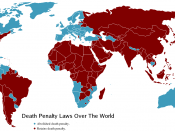An explanation of the Church's teaching today, which is in opposition to capital punishment, has been given in the last 25 years by the U.S. Catholic bishops in statements, from the "Statement on Capital Punishment" 1980, to the 2005 statement "A Culture of Life and the Penalty of Death" stating that "the use of the death penalty is unnecessary and unjustified in our time and circumstances."
Christians for the first three centuries were pacifistic and non-violent in their ethics but
this non-violent ethic within Christianity began to change and exceptions were made for the use of lethal force. In Christian tradition, the Fathers and Doctors of the Church are virtually unanimous in their support for capital punishment, even though some of them such as St. Ambrose exhort members of the clergy, not to pronounce capital sentences, or serve as executioners.
We will see that the Church's position on the ethics of capital punishment hasn't basically changed from her earliest stance.
Today however, there has been an important development in the teaching, especially since the more recent general aggiornamento of church teaching following Vatican II.
Early Church Teaching
Clement of Rome (died 101 A.D.) and Justin Martyr (died 165 A.D.) generally found taking human life to be incompatible with the gospel. Christians were not to participate in capital punishment. Later, after Christianity became the official state religion of the Roman Empire under Constantine (280-337 ce. approx.), opposition to the death penalty declined.
St. Augustine (ce.354-430) recognized the death penalty as a means of deterring the wicked and protecting the innocent. He writes in "City of God:
"The same divine law which forbids the killing of a human being allows certain exceptions....[sic] Since the agent of authority is but a sword in the hand, and is not responsible for the killing,


